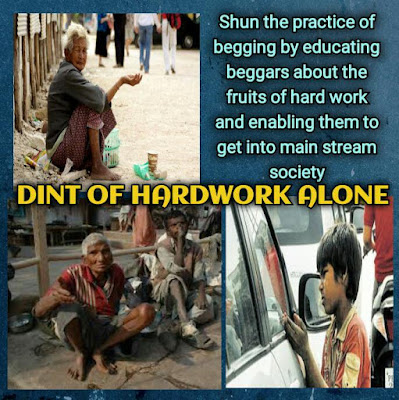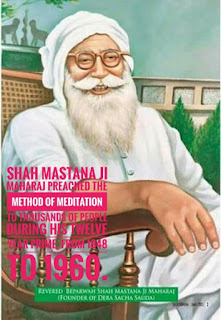Beggars are not begging for the sake of begging
-Dr.
Lalit Kumar Setia*
Dignity of Labour in Hearts of Beggers :
If somebody is well educated and also aware of the fruits of hard work; he
will never opt for the practice of begging to feed his or her family. The beggars
usually are less educated and those who decide never to work hard because they
have not worked hard in the past and never tasted the fruits of hard work. In most religious places like pilgrims and at public places such as bus-stands, and stations; the people can be seen who had made begging their profession. The beggars
have their own groups and they make people emotional to get more money by using
false practices such as pretending that they have been suffering from diseases
or they have been hungry for a long time etc. What can be the solution to make
them connected with the mainstream of society? There are a number of organizations
associated with the task of reducing the number of beggars by educating them? Is
there a need to provide employment to the beggars so that they can become
self-independent and never opt for begging as a profession? What can be done to
improve the image of society suffering from such beggars?
Dint of Hardwork Alone:

The children in primary classes are taught not to give anything to the beggars
so that the beggars decide to leave begging. It is assumed that if the beggars
will not get anything valuable through begging then they will be discouraged
from this practice and start doing hard work. Definitely, it works and it has
been seen that if a beggar in initial days of begging doesn’t get anything to
feed himself then he decides to leave begging. But on the same side, if a
person is not educated or less educated and there is none to inspire him or her
to do hard work then the person keeps begging for forever. The beggars in
streets, public places, religious places, and the increasing number of persons
to be associated with begging and even looking it as a profession; is a major
problem in front of the society. In metro cities, on red-lights whenever
vehicles are stopped, a lot of beggars start moving towards the vehicles and
try to get money from the people sitting inside vehicles through begging and
sometimes the children also found to be involved in begging. The decision for
opting begging for earning livelihood is always criticized, it is required to
make beggars self-independent.
I came in touch with an organization working on the same theme i.e.
connecting beggars to the main stream of society by educating them, giving them
opportunities to work hard then earn money, providing them employment so that
they become able to earn their livelihood and opt to leave begging for forever.
The organization working under the guidance of Saint Gurmeet Ram Rahim Singh Ji
Insan, is well known as Dera Sacha Sauda and located in Sirsa (Haryana). With
millions of followers around the world, the organization is working to remove beggars
by educating them, giving employment & making them realize the fruits of
hard-work. The organization under the pious guidance of Guru Ji, name this
initiative as “Dint of Hardwork Alone”.

The volunteers of Dera Sacha Sauda have explained that once a beggar is
provided opportunity to earn his or her livelihood, he or she be connected with
the mainstream of society and opt to leave begging for forever. It is found
that the beggars whenever asked to leave begging, they try to escape or fight
with the person guiding to do so; but if they are provided with the work by
offering significant amount they start thinking to do hard work and even opt
the work in their life. In the approach of the volunteers, it is found that we
never give money to the beggars but give them a way to earn money so that they
become self-reliant and leave the practice of begging.
A Judgement for a Thief
There was a fifteen year old boy in America, He was caught stealing from a store. On trying to escape from the hold of the guard, a shelf of the store was also broken.
The judge heard the crime and asked the boy, "Did you really steal something, a packet of bread and cheese"?
The boy responded by looking down. ;- Yes'.
Judge,: - 'Why?'
Boy,: - I needed.
Judge: - 'Could have bought.
Boy: - 'There was no money.'
Judge: - Take it from the family.
Boy: - 'There is only mother in the house. Sick and unemployed, Bread and Cheese were also stolen for the same
Judge: - You don't do anything?
Boy: - Used to wash a car. When I took a day off to take care of my mother, I was fired.
Judge: - Dont you ask someone for help?
Boy: - Had left the house since morning, went to about fifty people, took this step at the very end.
When the arguments ended, the judge began to pronounce the verdict, the theft and especially the theft of Bread is a very shameful crime and we are all responsible for this crime. 'Every person in the court, including me, is a perpetrator, so every person present here is fined ten dollars. No one can get out of here without giving ten dollars. '
Saying this, the judge took ten dollars out of his pocket and then picked up the pen and started writing: - In addition, I fined the store a thousand dollars for handing over a hungry child to the police.
If the penalty is not deposited within 24 hours, the court will order to seal the store.
By giving the full amount of fine to this boy, the court asks for forgiveness from that boy.
After hearing the verdict, tears were pouring from the eyes of the people present in the court, that boy's hiccups were also tied. The boy was watching the judge again and again, who came out hiding his tears.
Are our society, systems and courts ready for such a decision?
Chanakya has said that if a hungry person is caught stealing bread, then the people of that country should be ashamed.
*Copyright © 2018 Dr.
Lalit Kumar. All rights reserved.





















